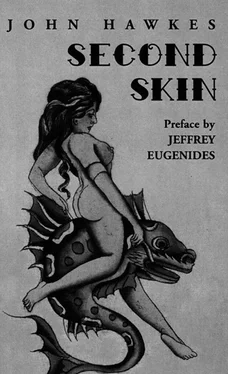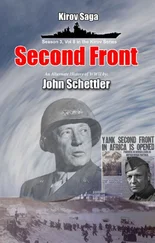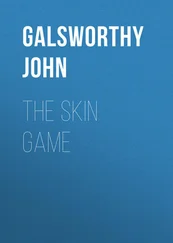“And we don’t even have sandwiches tonight, Cassandra. Not one.”
I felt the child’s tiny knee in my groin — determined and unerring step — I felt her any hand return again and again to tantalize and wound itself against my unwashed cheek, absently I picked at the chocolate that had dried like blood on the old sailcloth or cotton or white drill of my uniform. And finding a plugged-up nipple secreted like a rubber talisman or ill omen in my pocket; watching Cassandra stuff a pair of Pixie’s underpants into the flight bag; discovering that between my two white shoes there was another, the foot and naked ankle and scuffed black shoe of some long-legged sailor who had stretched himself out at last — in orgasm? in extreme discomfort? — and seeing Cassandra’s face dead white and realizing that finally she had scraped the bottom of the cardboard face powder box which I had saved along with her stockings: all of it reminded me of the waxworks museum we had visited with Sonny, reminded me of a statue of Popeye the Sailor, naked except for his cap and pipe, which we had assumed to be molded of rubber until we read the caption and learned that it was made of eight pounds and five different brands of chewed-up chewing gum, and reminded me too that I could fail and that the teen-age bomb could kill the queen or the queen the bomb. The beginnings of a hot and hungry night.
But I must have lain there musing and grumbling for hours, for several hours at least, before the tire exploded.
“Oh!” came Cassandra’s whispered shriek, her call for help, and I pinioned Pixie’s rump, I sank down, my knees were heaved into flight, Cassandra was floating, reaching out helplessly for her child. In the next instant the rear half of the bus was off the road and sailing out, I could feel, in a seventy-eight-mile-an-hour dive into the thick of the night. Air brakes in full emergency operation. Accidental blow to the horn followed by ghastly and idiotic trill on the trumpet. Diving rear end of the bus beginning to describe an enormous arc — fluid blind path of greatest destruction — and forward portion lurching, hammering, banging driver’s black head against invisible wall. Now, O Christopher… and then the crash.
Then: “Be calm, Cassandra,” I said, and kept my hold on the agitated Pixie but uncovered my face.
And she, whispering, breathing deeply: “What is it, Skipper? What is it?”
“Blowout,” I said, and opened my eyes. We were standing still. We were upright. Somehow we had failed to overturn though I saw her naked legs with the knees caught up to her chin and though everywhere I looked I saw the duffel bags lying like the bodies of white clowns prostrate after a spree of tumbling. And in this abrupt cessation of our sentimental journey, becoming aware of moonlight in the window and of the thin black line of the empty highway stretching away out there, and feeling a heavy deadness in my shoulder — twisted muscles? severed nerves? — I was able to glance at my free hand, to study it, to order flexing of my numerous and isolated fingers. I watched them. One by one they wiggled. Bones OK.
“Are you all right, Cassandra? Can you move your toes?”
“Yes, Skipper. But give Pixie to her mother, please.”
So we disembarked. We joined the slow white procession of hatless sailors. In the dark and among the angular seventeen-year-olds with ties askew and tops askew, among all the boys red-eyed and damp from cat-napping and too baffled, too bruised to talk, we felt our way up the canted aisle until we reached the listing door, the puckered aluminum steps, the open night. I took her in my arms and swung her down, and out there we stood together, close together, frock and uniform both body-tight in the wind, ankles twisting and shoes filling with sand. The bus was a dark blue dusty shadow, deceptive wreck; our skid-marks were long black treacherous curves in the desert; the highway was a dead snake in the distance; the wind was strong. We stood there with the unfamiliar desert beneath our feet, stood with our heads thrown back to the open night sky which was filled with the tiny brief threads of performing meteors.
The wind. The hot wind. Out there it warmed the skin but chilled the flesh, left the body cold, and though we lifted our faces like startled sun-tanned travelers, we were shivering in that endless night and in the wind that set the long dry cactus needles scraping and made a rasping noise of all the debris of the desert: tiny cellular spines, dead beetles, the discarded translucent tissue of wandering snakes, the offal of embryonic lizards and fields of dead dry locusts. All this rasping and humming; all the night listening; and underfoot all the smooth pebbles knocking together in the hot-cold night. And she, Cassandra, stood there swaying and clasping Pixie awkwardly against her breast, swaying and trying to catch her breath behind Pixie’s head; and the pale little fissure of Cassandra’s mouth, the pale wind-chapped tissue of the tiny lips made me think of cold kisses and of goose flesh and of a thin dust of salt and of lipstick smeared helplessly on the white cheek. I took her elbow; I put a hand on her back and steadied her; I was surprised to feel the broad band of muscle trembling in her back; I thought of the two of us alone with a hundred and one sailors cut down and left for dead by a pack of roving and mindless Mexicans. Then in our roller-skating stance — hand to elbow, hand to waist — we began to move together, to stagger together in the moonlight, and over my shoulder and flung to either side of the harsh black visible track of our flight from the road I saw the prostrate silhouettes of a dozen fat giant cacti that had been struck head on by the bus and sent sailing. For a moment I saw them, these bloated shapes of scattered tackling dummies that marked the long wild curve of our reckless detour into the dark and milky night. Abandoned. As we were abandoned.
And then the lee of the bus. Clumps of squatting white shivering sailors. A pea jacket for Pixie. Another pea jacket for Cassandra. A taste of whisky for me. Little pharmacist mates clever in first aid and rushing to the sounds of chattering teeth or tidelands obscenity. While the black-faced driver hauls out his hydraulic jack and drags it toward the mutilated tire which has come to rest in a natural rock garden of crimson desert flowers and tiny bulbs and a tangle of prickly parasitic leaves. All crushed to a pulp. Mere pustules beneath that ruined tire.
It was the dead center of some nightmare accident but here at least, crouching and squatting together in the lee of the bus, there was no wind. Only the empty windows, shadows, scorched paint of the crippled monster. Only the flare burning where we had left the road and now the scent of a lone cigarette, the flick of a match, the flash of a slick comb through bay rum and black waves of hair, persistent disappointed sounds of the ukelele— devilish hinting for a community sing — only the cooling sand of the high embankment against which Cassandra and Pixie and I huddled while the sailors grew restless and the driver — puttees, goggles, snappy cap and movements of ex-fighter-pilot, fierce nigger carefully trained by the Greyhound line — bustled about the enormous sulphuric round of the tire. Refusing assistance, removing peak-shouldered military jacket, retaining cap, strutting in riding britches, fingering the jack, clucking at long rubber ribbons of the burst tire: “Why don’t you fellows sing a little and pass the time?” But only more performing meteors and this hell’s nigger greasing both arms and whistling, tossing high into the air his bright wrenches. In the middle of the desert only this American nigger changing a tire, winning the war.
I unlaced my dirty white buckskin shoes and emptied them. I glanced at Cassandra. I glanced at Pixie who, even though cloaked in her pea jacket, was beginning to play in the sand; I tried to smile but the driver cavorting in the moonlight dispirited me and I wondered where we were and what had become of poor dear Sonny. I hooked one foot onto the opposite knee, gripped the ankle, brushed the sand from the sole of my white sock, repeated the process. I glanced again at the night sky — unmoved by celestial side show — and for some reason, scowling into the salt and pepper stars, gritting my teeth at that silent chaos, the myriad motes of the unconsciousness, I found myself thinking of Tremlow, once more saw him as he looked when he bore down upon me during the height of the Starfish mutiny. Again I lived the moment of my degradation. Then just as suddenly I was spared the sight of it all.
Читать дальше












